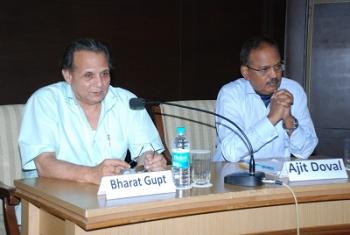During the VIF’s monthly discourse ‘Vimarsha’, which was held on July 29, 2011, Dr. Bharat Gupt, an eminent scholar of civilisational studies, deliberated upon the ‘Role and Relevance of Saints and Religious Leaders in Constitutional polity’ – a subject which lies at the center of current political debate in our country. Mr. Ajit Doval, Director VIF, presided over the session and also introduced the speaker to the audience. Taking a dig at some political actors and certain sections of the intelligentsia who suggest that religious leaders should refrain from taking part in activities with political overtones, Mr. Doval asked, who are these ‘people’ the preamble in the constitution of India refers to as ‘we the people of India’? The people of India did not come into existence from nowhere on January 26, 1950. They have existed for thousands of years and beyond. The constitution of India, according to Mr. Doval, is an embodiment of people’s aspirations. Underlining the importance of an inclusive approach which is needed in the constitutional polity of India, Mr. Doval pointed to the dynamics of a collective mindset that went into making of the constitution. The collective wisdom or the mindset of people, according to Mr. Doval, is essentially a product of cumulative experience of people, shaped and nurtured through the centuries’ old ethos, values and religious heritage which are anchored deeply in the psyche of our nation.
Speaking in a packed auditorium, Dr. Bharat Gupt said that interventions by India’s religious leaders in the affairs of state have remained standard norms through the ages which are amply illustrated in our classical texts. Denial of political space to the religious leaders in independent India indicates that something is terribly wrong with the present cultural fabric of India, lamented Dr, Gupt. The present education system in India which is bereft of any ethical or moral values – India’s rich religious and cultural heritage - is what has led to the present political and cultural degeneration of India, exemplified by greed, falsehood, a culture of sycophancy and a near collapse of good governance.
Keeping all religions at arm’s length - a Nehruvian model of secularism practiced in India since Independence has added further to the problem. Dr. Bharat Gupt however pointed to a fallacious argument broached by many modern secularists that all religions are the same as they preach the same values. Drawing a line of distinction between Abrahamic and Dharmic religions, Dr. Gupt emphasized that whereas the former - the likes of Christianity or Islam - being monotheistic in nature aims at religious proselytizing, the later lays greater emphasis on righteous conduct by the people. Dr. Gupt however said that there is no such thing as eternal commandment.
An honest endeavour should be made to incorporate right percepts in India’s present educational curriculum which are evolved after proper and continuous dialogue across complete political and religious spectrum. Dr. Bharat Gupt however emphasized the need to engage with the values of every religion on a progressive basis. It is equally important that interventions are made by religious leaders in affairs of state on a progressive basis. Commenting upon the recent removal of Ghulam Mohammed Vastanvi from his post as Darul Uloom Deoband's Vice Chancellor, he said that Vastanvi was removed because he made a statement which was politically incorrect. Dr. Gupt however opined that if the decision to remove Vastanvi could have been inspired by some value judgment passed by him on the laws of Sharia, perhaps it would have made more sense to the common people.
An animated discussion followed the talk during which several questions came up for clarification. A member of the audience said that while constitution was a term understood very well by everyone, what defined a religious leader. It is the people’s perceptions that define a religious leader, clarified Dr. Bharat Gupt. Mr. Ajit Doval, Director VIF, thanked Mr. Bharat Gupt for an illustrious presentation.






